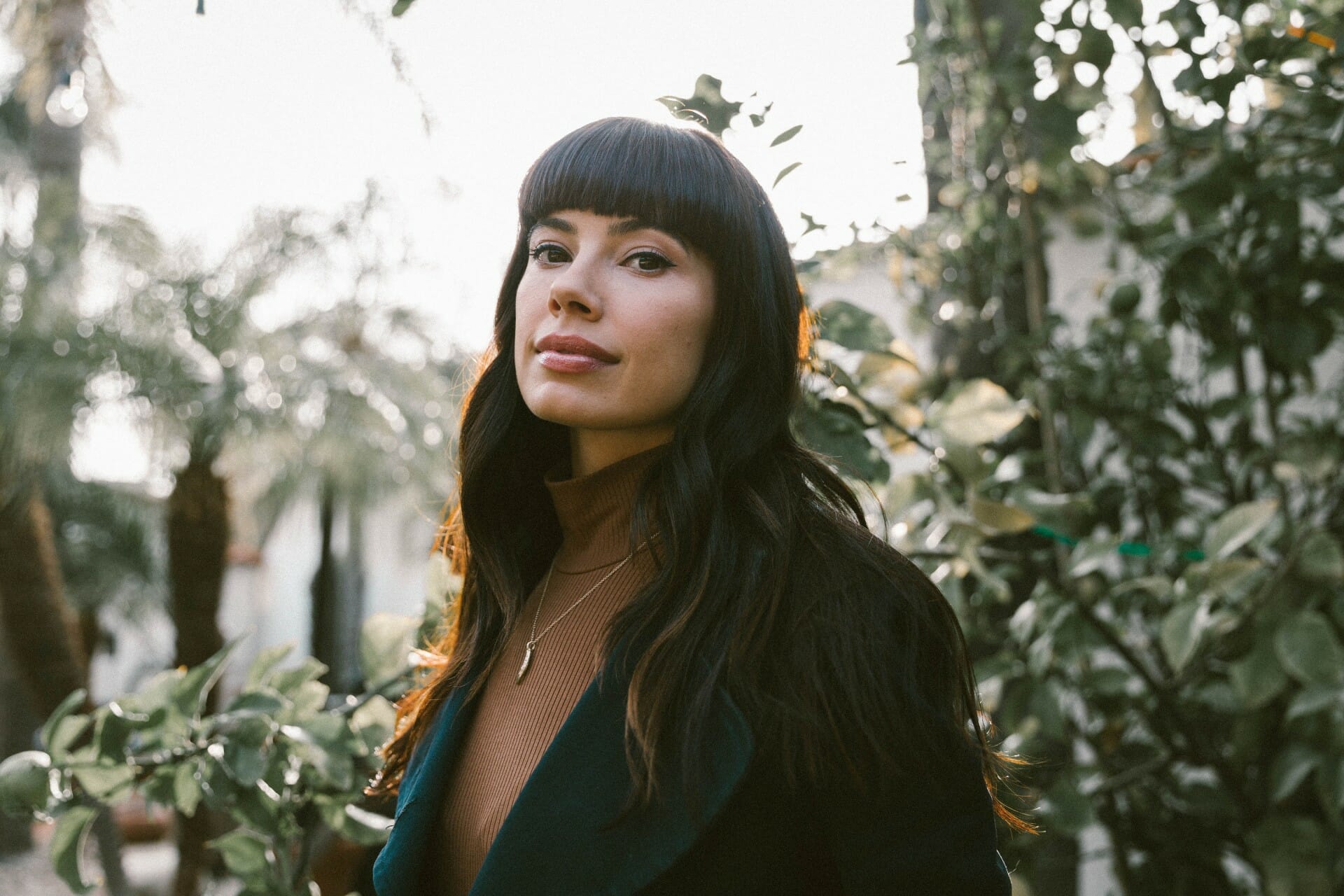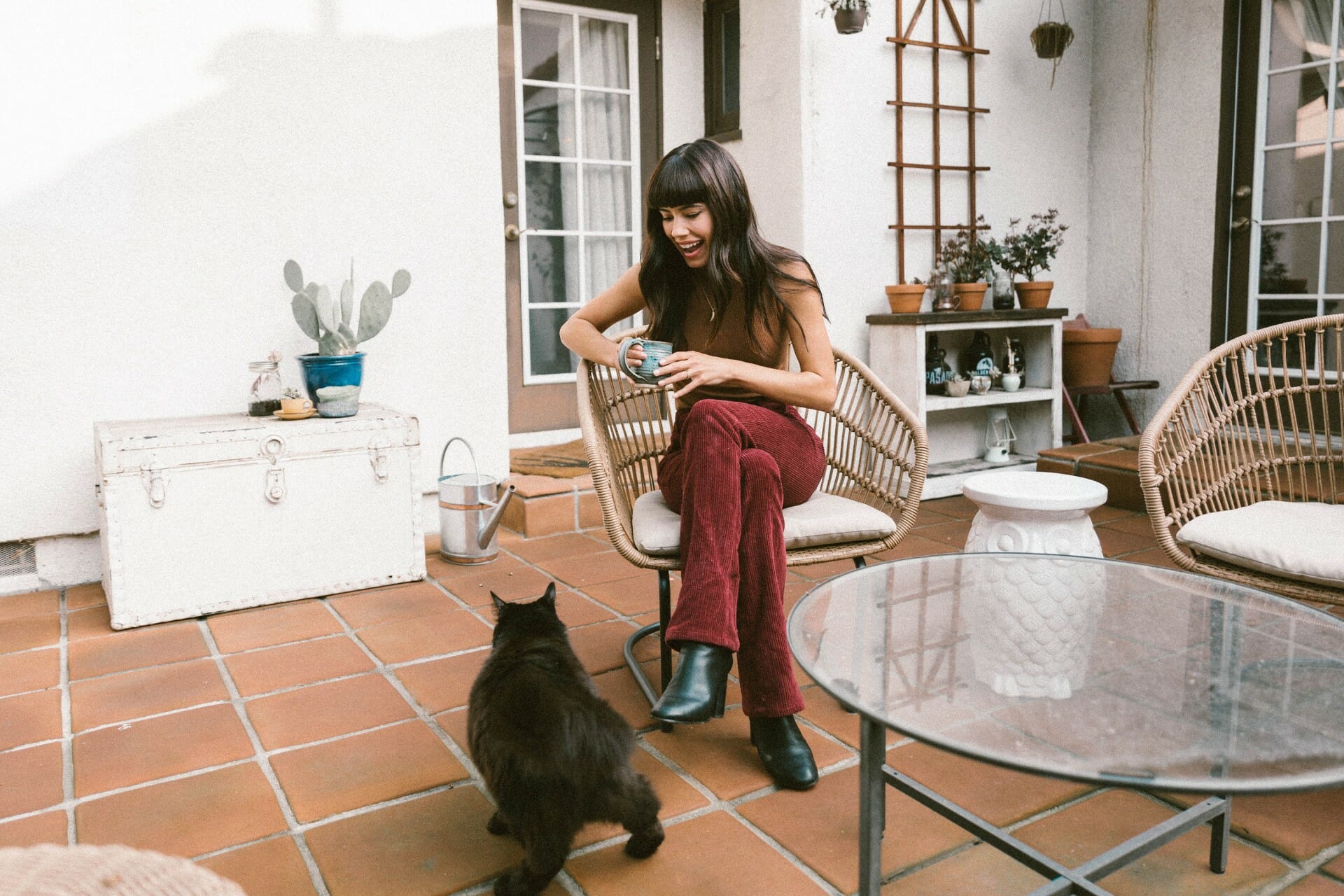It was an exciting awards season for Jenna Lyng Adams, who plays Darshani on Netflix’s Kominsky Method. The show received six major nominations in 2019 including the Golden Globe Win for Best Television Series – Musical or Comedy and the Screen Actors Guild Nomination for Outstanding Performance by an Ensemble in a Comedy Series. While Adams is excited to dance in the spotlight, her creative contributions to the industry go far deeper than that of an actress. As a writer, producer, and former casting director, Adam’s career is undoubtedly diverse. We were fortunate enough to meet up with her to drink coffee, meet her cats, and discover what’s next for the budding renaissance woman.

BLNCD: Over the past fifteen years, you’ve had quite the journey from doing community theatre in Minnesota to becoming a heavily recurring character on a Netflix series in Los Angeles. What have been some of those key moments or realizations that have helped you connect the dots as an actress?
JLA: In the last few years especially, I’ve learned to start accepting what’s in my control and what’s not. As an actor, so much of the audition process especially is out of your hands. When it comes down to it, you can only control your own performance. Now, I go into rooms with the intention of doing work to make myself happy. I take risks and make choices that excite me. Because if I don’t enjoy my work, why should anyone else?
BLNCD: Your character, Darshani, in Netflix’s Kominsky Method has a myriad of struggles throughout the first two seasons. Which of Darshani’s challenges resonated the most for you?
JLA: Season one was a lot about mortality and aging. Whereas season two brings in more hopeful themes of legacy and passing the torch to the next generation. One aspect of this is Sandy Kominsky (Michael Douglas) teaching his students to dig deeper as artists. He helps my character Darshani face her trauma. Sandy teaches her that her pain is part of what makes her whole, and shutting it off will only hurt her— as a human and as an actress. In order to move forward in her work, she has to break down the walls she built up over the years. Like Darshani, I have had to take the most painful experiences in my life and find ways to channel them into my work. Sometimes the ugliest sides of yourself and your darkest memories are what you need to unpack in order to bring out your most vulnerable work. And hopefully in doing so, you can help someone in the audience through accepting themselves as well.
BLNCD: In more recent years, you’ve taken a dive into screenwriting. When did your love for writing first begin?
JLA: I always loved creative writing growing up, whether I was writing poetry or short plays. In high school, I bought a camera and started making my own short films. In college, I learned how to properly format a screenplay and put my work into practice with student crews and better equipment. For most of my early years in LA, I worked as a freelance producer and production manager on new media projects as well as independent films. But I always kept writing on the side, even if it was in the middle of the night or kept me in on weekends when all my friends were going out. I think that’s the test if you truly love your work — if nobody is paying you or asking you to create something, but you do it anyway. I had these characters knocking around in my head and I had to get them out. And now, some of those scripts that I worked on years ago are being pulled from the hard drive abyss and given new life.

BLNCD: Having written for both television and feature films, how do the mediums differ in the challenges and joys of creating their scripts?
JLA: So far, I absolutely love writing for both mediums for opposite reasons! For example, a feature screenplay feels like a tidy little box compared to a pilot script. You can plan your perfect ending in a feature, but there is a lot of pressure to make it feel complete. And a pilot needs to be a springboard to (ideally) many seasons. You can live with these characters for years if you manage to keep the plot going. When I’m writing a feature, it’s oftentimes solo work. You have all the power but can also go a little crazy. My experience so far in television is that it is very collaborative. There are a lot of hands in the pot, but it’s also wonderful to have the support and sounding board of a whole team of intelligent and enthusiastic creatives.
BLNCD: Working as a freelancer is Los Angeles can often make life feel truly chaotic. Do you go out of your way to ground yourself in any daily rituals or routines?
JLA: Well, I recently bought a house and am living through renovations, so my normal routine is a little off at the moment! But I like to ground myself by cooking. It’s my version of meditation and also when I get some of my best thinking time in. And I’ve greatly improved at taking shorts breaks when I need them. Instead of popping some aspirin for a headache and powering through more computer work, I’ll just have some herbal tea and rest for fifteen minutes. It’s important to give your mind breaks as well as your body.
BLNCD: Do you ever use CBD products?
JLA: Yes! I use BLNCD’s wintergreen relief salve on my hands almost every day. I put a lot of strain on my hands — whether typing at my computer, working out, or cooking (and cleaning up after cooking!). That salve is an absolute miracle worker. I also use BLNCD’s Bliss CBD oil when I’m writing or when I’m on-set. I recently did a lot of stunt work on a guest star role and both of those products really saved me. I also love to support female-owned companies that are conscious of low-waste packaging. Wins all-around!
BLNCD: Juggling writing, producing, and acting requires a tremendous amount of organization and time management skills. Any tips or advice for optimizing productivity if you’re someone who does many things?
JLA: I rely on my lists and calendars to get everything done. If I don’t write it down then it’s just floating around in my head amongst too many projects and timelines. I also organize my tasks based on urgency, otherwise it’s easy to get sidetracked from what’s most important — or most daunting. That said, time efficiency is just as important as time management. Give yourself a set amount of time to get the task done, and make sure you hit that. If you can train your brain to get more done in less time by focusing better, you’ll be able to take that extra time for more self-care— which is also a very important part of productivity!
BLNCD: What’s on the horizon for 2020?
JLA: I’m currently penning a pilot script called “So Much” for HBO Max with my writing partner Anna Akana and executive produced by Diablo Cody and Jim Parsons. I just starred in a very exciting indie thriller called “The Presence” that is now in post-production. And another film I poured a lot of myself into, “Before The Fire,” will be premiering this spring at festivals. I look forward to sharing more details about both films very soon. And, hopefully, Darshani can return in season 3 of “The Kominksy Method”!
Photography by Martha Kirby
Story by John Mark

